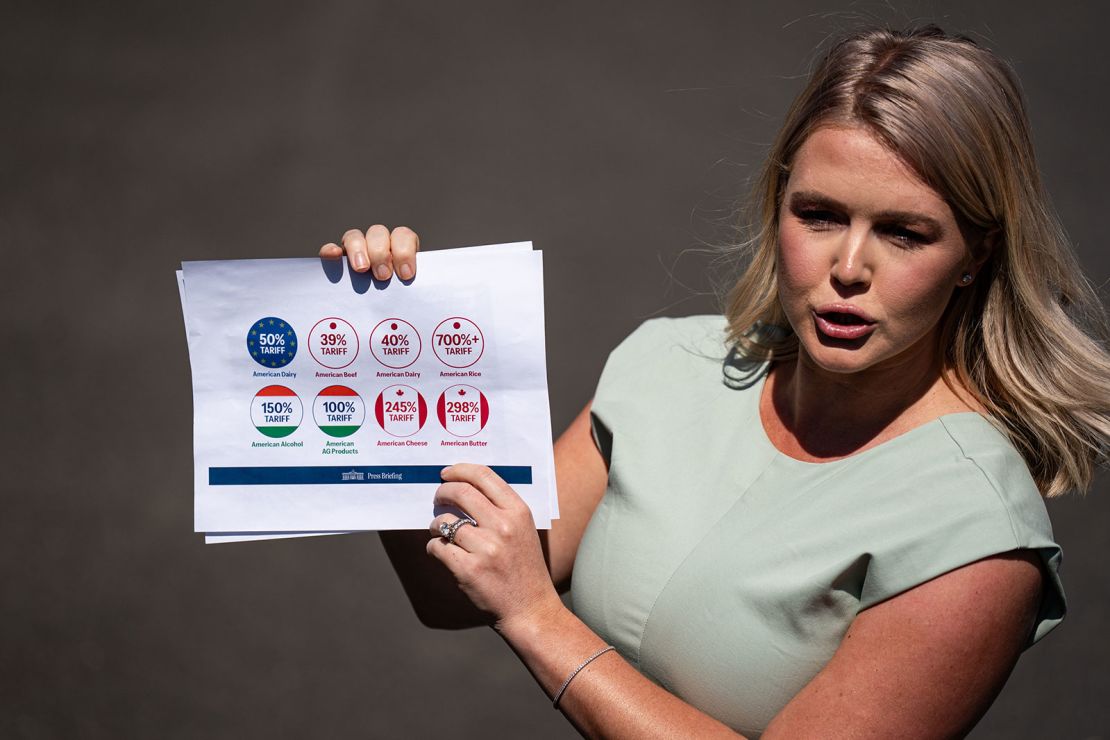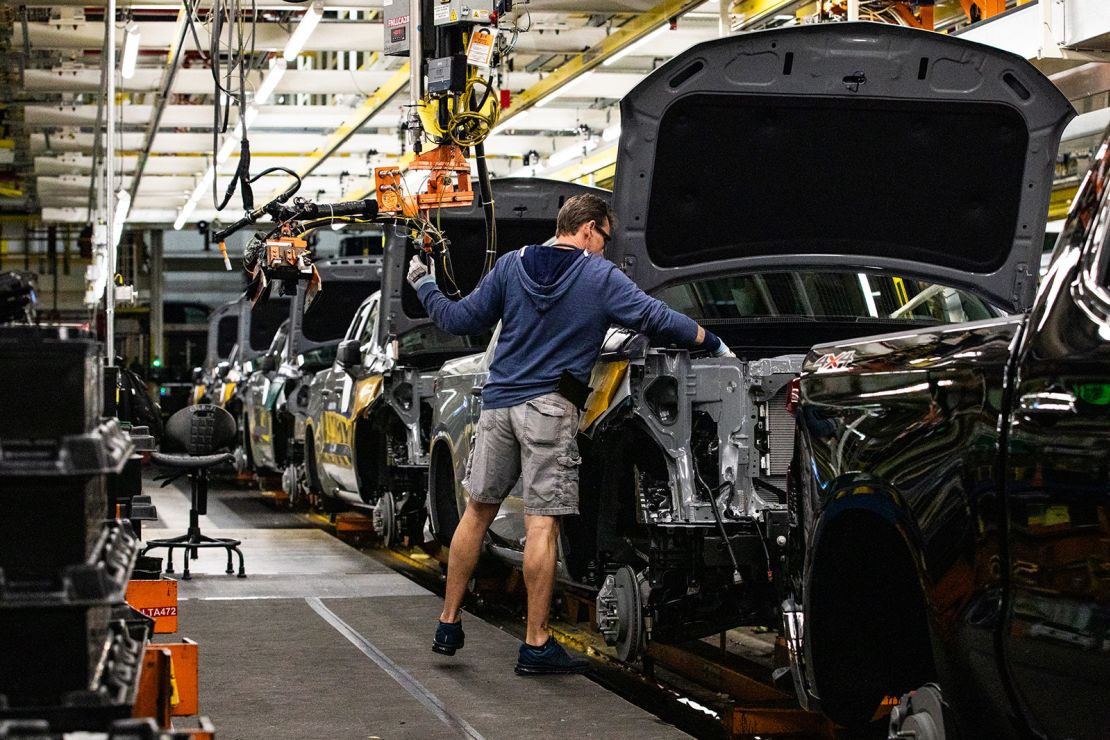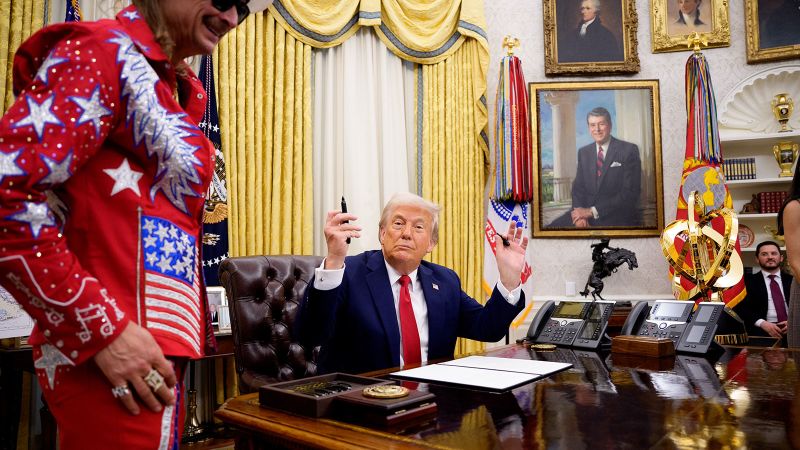CNN
—
He’s got the world hanging on his every word — and that’s how he loves it.
President Donald Trump held court in the Oval Office on Monday evening, ratcheting up suspense over his promised tariff war “Liberation Day” on April 2 and riffing on his 19th-century worldview that threatens to rock the 21st-century economy.
It was an extraordinary spectacle — an all-powerful president, surrounded by his gaudy golden trinkets, flags and ornaments, seemingly improvising in real time about a still-mysterious plan that could deliver untold economic consequences to billions of people worldwide.
One minute, Trump was flinging threats at trading partners he accuses of ripping off America. The next, he doused his fire with promises to be “kind,” in the latest in a string of contradictory signals that have sent global markets on a wild ride.
“This is going to be an amazing — I call it a lot of different names — but it really in a sense is a rebirth of a country,” Trump declared of a policy that economists fear will hike already high-prices and could push the US toward a recession.
If the moment wasn’t surreal enough, Trump was flanked by Kid Rock, who was resplendent in a spangled Stars and Stripes-themed suit and who the president helpfully pointed out is “sometimes referred to as Bob.” The rapper was there to highlight a new executive order cracking down on scalpers who exploit fans by inflating concert ticket prices. But his host had an older obsession on his mind.
A belief in the almost mythical power of tariff warfare has been a rare constant in Trump’s business and political career since the 1980s — when the big threat he perceived to US prosperity was Japan, rather than top current rivals China and the European Union.
Now, if he chooses, he can finally implement his vision for tariff policies designed to build American manufacturing and to weaken other nations, including many that have been allies for decades but are now reconsidering the entire span of their relations with a suddenly hostile United States.
“We help everybody, and they don’t help us,” Trump complained to reporters, voicing his spartan win-or-lose philosophy that explains his entire life and that he has now made the signature attitude of the United States.

Trump has already told his aides to prepare pageantry for Wednesday, when he’ll walk into the White House Rose Garden surrounded by Cabinet members to announce the scope of duties he plans to slap on imports.
But after weeks of bluster over tariffs followed by last-minute blinks — then redoubled threats and implemented import penalties designed to hurt America’s friends, such as Canada and Mexico — no one knows what he will say. Judging by his freewheeling chat to reporters, that may include Trump himself.
Will he impose across-the-board matching tariffs on nations that use protectionism against US exports? Or will the president simply target all goods coming into the country? Or will Trump take a nation-by-nation approach designed to grind out new bilateral arrangements?
The rationale behind imposing stiff tariffs — a policy weapon that dominated the foreign and economic policy of the early United States — is to protect domestic industries by making foreign goods less competitive.
In some cases, the smart, strategic use of higher duties can be good policy — if it nurtures industries critical to national security, such as steelmaking. And the president is bent on helping millions of his voters in onetime industrial heartlands made destitute by the loss of jobs to low-wage foreign nations.
But Trump also appears to favor the blunt and indiscriminate use of tariff warfare. This poses huge risks to the economy, since it could raise prices of goods across the board, dampen demand among consumers and cause a disastrous recession.
And there will be costs. Countries whose exports are hammered as they enter the US will respond in kind.
This is why Trump’s rambling reasoning Monday evening looked a lot like playing Russian roulette with the US and world economies.
“You’re going to see in two days,” he told reporters who requested details on his plans.

This huge uncertainty is one reason why stocks have just recorded the worst start to the year since 2022.
Many of the president’s allies on Capitol Hill still hope he’s bluffing — employing the familiar argument that he’s a great dealmaker who stakes out the most extreme position to extract concessions from adversaries.
But there’s a growing sense of hubris surrounding Trump and his team, some of whom falsely argue that tariffs represent a tax cut rather than a tax hike for consumers. Things rarely end well when presidents seem determined to prove their critics wrong, at any cost, in the face of inconvenient truths.
The White House is showing no signs of doubt ahead of a decision that could be fateful for Trump’s second term and the retirement savings of millions of Americans already hit by market sell-offs.
“He has a brilliant team of trade advisers,” White House Press Secretary Karoline Leavitt said Monday, highlighting officials including Treasury Secretary Scott Bessent, Commerce Secretary Howard Lutnick, trade adviser Peter Navarro, senior aide Stephen Miller and Vice President JD Vance.
“All of these individuals have presented plans to the president on how to get this done, and it is the president’s decision to make,” Leavitt added.
Her comment underscored how this grave, potentially world-changing decision is now down to a president who picked second-term advisers who won’t challenge him and who has rejected the economic orthodoxy that made the US the globe’s richest-ever superpower.
Nervousness is not limited to foreign governments whose economic forecasts in an already growth-challenged time could be knocked off kilter by Trump’s choices. There’s deepening disquiet on Wall Street, with more analysts getting bearish on economic growth. And even some of the president’s fellow Republicans are becoming skittish.
GOP Sen. Susan Collins slammed more proposed tariffs on Canada, warning that they’d especially hurt her state. “Maine’s economy is very integrated with our Canadian neighbors, and everything from potatoes to lobster to blueberries that are produced in Maine are often processed in Canada,” said the Pine Tree State Republican, who wore a pin with the Stars and Stripes and Maple Leaf flags.
Collins, who faces an increasingly complex reelection bid next year, added: “There are so many examples I can give you of how harmful these tariffs would be, and I also think that it makes no sense.”

GOP mayor explains what effects Trump’s tariffs could have on his city
CNN’s Ali Main, Manu Raju and Jenna Monnin reported on more Capitol Hill unease with Trump’s looming tariff announcement. Wisconsin Sen. Ron Johnson, for instance, warned: “I’ll wait to see what President Trump’s going to do. He’s used tariffs in the past effectively, to get nations to do what they should have done anyway. Right now, I’ll give him the benefit of the doubt, but I’m concerned.”
It’s not clear whether the president will be swayed by this anxiety inside a party that has shown him remarkable deference.
On Monday night he suggested that perhaps the tariffs would not be as tough as some fear.
“We are going to be very nice, relatively speaking. We are going to be very kind,” the president said, before launching into a strangely intimate digression. He spoke of someone who didn’t know him well who offered him a compliment recently. “They said — ‘You are such a kind person’ and I said, ‘Say that again.’ They said, ‘You are a kind person.’ I said, ‘I’ve never heard that before.’”
Trump went on wistfully: “It was a weird statement … I’ve been called a lot of things but it’s sort of a different kind of a word, it’s like an old-fashioned word, isn’t it, eh?”
Some investors might perceive restraint. But Trump kept returning to his decades-old rhetoric. “Other countries are understanding because they have been ripping us for 50 years; they have been ripping us off right from the beginning.”
And a president who at the weekend said he “couldn’t care less” if his auto tariffs cause massive hikes for Americans buying new cars seems increasingly out of touch with rising anxiety in the country as he waxes about a new golden age.
“The term I like best is ‘the liberation of America,’” Trump said.

